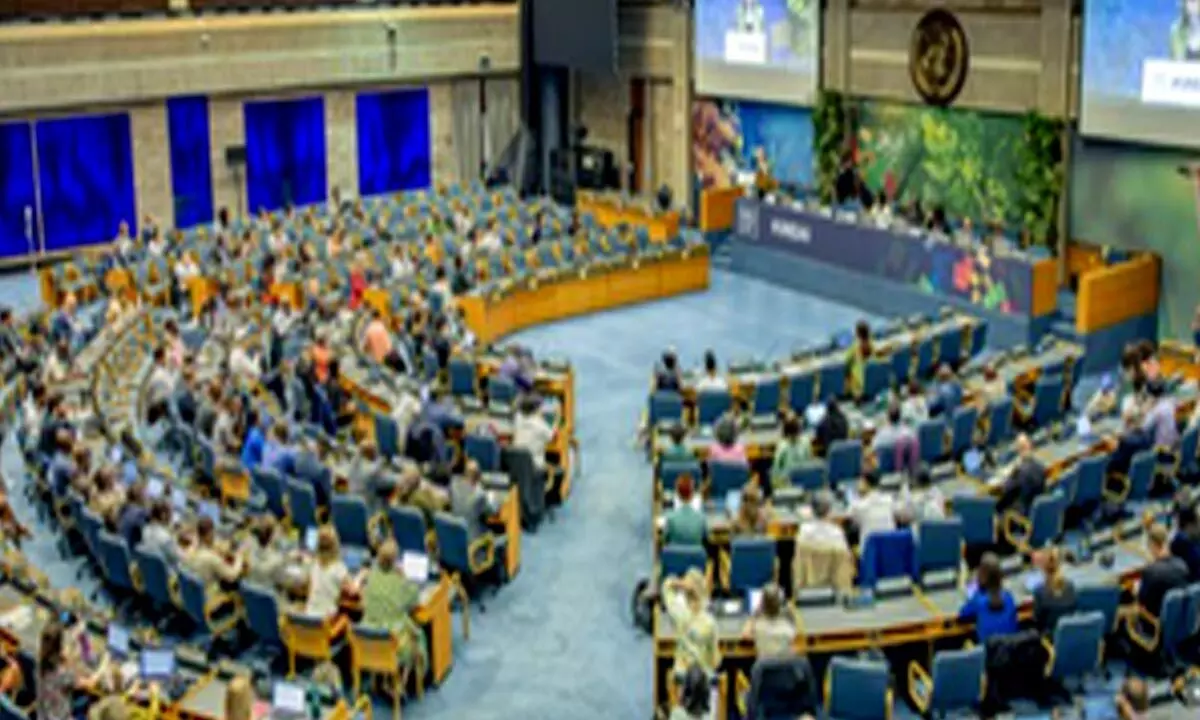UN Environment Assembly in Nairobi set to address triple planetary crisis
Share :

In the backdrop of 2023 being the warmest year on record, with resultant heatwaves, storms and droughts causing havoc, heads of state and more than 5,000 representatives and leaders will gather in Nairobi in Kenya from Monday for the five-day sixth UN Environment Assembly
New Delhi: In the backdrop of 2023 being the warmest year on record, with resultant heatwaves, storms and droughts causing havoc, heads of state and more than 5,000 representatives and leaders will gather in Nairobi in Kenya from Monday for the five-day sixth UN Environment Assembly (UNEA) to strengthen multilateral effort to address the planetary crisis of climate change, nature and biodiversity loss, and pollution and waste.
The Assembly, which usually meets biennially and sees visionaries from the business sector, governments, scientific institutions, and civil society, is the world's top decision-making body on matters related to the environment and includes all 193 UN member states.
Observers told IANS that there are 20 draft resolutions and two decisions on the table, among them a resolution on the metals and minerals issue.
"UNEA-VI will place particular focus on how stronger multilateralism can help us to do this," said UNEP Executive Director Inger Andersen earlier this month.
"It will drive united, inclusive and multilateral action that addresses every strand of the triple planetary crisis as one indivisible challenge."
In the run-up to the UNEA, aptly called "world's parliament on the environment," ministers and partners of the UNEP-convened Climate and Clean Air Coalition (CCAC) launched a Clean Air Flagship effort to provide a platform to boost regional coordination and private sector engagement, data-led policy action, financing, science and advocacy.
UN General Assembly President Dennis Francis will deliver his address at the opening of the high-level segment that will be held on February 29 and March 1.
The segment will consist of an opening plenary with statements by key dignitaries, national statements; three leadership dialogues, a multi-stakeholder dialogue, and a closing plenary meeting during which UNEA will take action on the draft Ministerial declaration as well as the draft resolutions and decisions.
India will be represented by the Ministry of Environment, Forests and Climate Change's Additional Secretary Naresh Pal Gangwar.
Government leaders plan to use the Assembly to renew calls for progress on the sustainable development goals, a global blueprint for protecting the planet and promoting prosperity. Just 15 per cent of the goals, which come due in 2030, are on track.
"We must find practical ways to advance the human rights to a healthy environment, which is crucial for sustainable development," said Leila Benali, Morocco's energy transition minister and the President of UNEA-VI.
"We know that when we protect the natural world, public health improves. When we focus on sustainable solutions to the climate crisis, our economies get stronger."
Also on the agenda of the Assembly will be ways to tackle the dramatic increase of wasteful and fuel-intensive plastics, which is feeding the climate crisis.
More than 99 per cent of plastic is made from chemicals sourced from fossil fuels, the substances responsible for 86 per cent of C02 emissions in the last decade. Plastic pollution reinforces the need for a binding plastics treaty as well as a fossil fuel treaty that can tackle the root cause of both the plastics pollution crisis and the climate crisis through phasing out oil, gas and coal production.
In 2022, the Assembly ended with countries agreeing to launch negotiations on a legally binding global instrument to end plastic pollution.
That was one in a recent string of ambitious international agreements on environment. Last September, countries and businesses inked a landmark pact to prevent pollution from chemicals and waste.
Two months later, at the UN Climate Change Conference, countries vowed for the first time to transition away from the fossil fuels that are superheating the earth and driving climate change.
Researchers find that if no action is taken, annual plastic production will rise 22 per cent between 2024 and 2050, and plastic pollution will jump 62 per cent between 2024 and 2050. By continuing with business as usual, the world would generate enough litter between 2010 and 2050 to cover the entire island of Manhattan with a 3.5-km-tall heap of plastic -- nearly 10 times the height of the Empire State Building.
With a strong UN plastics treaty that incorporates the right mix of nine plastic reduction policies, however, plastic pollution could be virtually eliminated in 2040 -- with the generation of mismanaged waste reduced by 89 per cent to a more manageable 10 million metric ton per year in 2040.
















